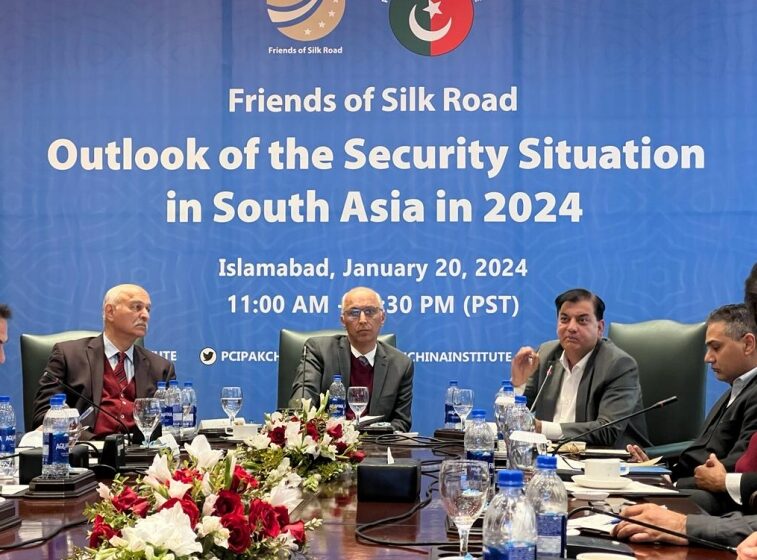PCI hosts dialogue on “outlook on South Asia Security”

The Pakistan-China Institute (PCI) under the Friends of Silk Road (FOSR) Initiative recently organized a crucial dialogue focusing on the “Outlook of Security Situation in South Asia in 2024.” Held simultaneously in Islamabad and the Quetta Press Club, the event drew seasoned diplomats, security analysts, scholars, researchers, and journalists to discuss and analyze the evolving regional security landscape.
Chaired by former Pakistani Ambassador to China, Moin-ul-Haque, the dialogue commenced with an insightful opening speech by Senator Mushahid Hussain Sayed. He delved into China’s Global Security Initiative (GSI), presenting it as a new framework for resolving security issues globally. Emphasizing the indivisibility of security and respect for sovereignty, the GSI aims to foster a security governance framework encompassing AI, cybersecurity, and other related threats.
Senator Mohammad Abdul Qadir underscored the economic challenges facing Balochistan and highlighted the transformative potential of the Gwadar Port. He emphasized Chinese investments as catalysts for economic growth, job creation, and increased trade in the region, with a special mention of the role tourism can play in development.
Lt. General (r) Muhammad Afzal, Former Chairman NDMA & DG FWO, presented on the “Western Route-CPEC opportunities for development and stability.” His presentation explored the achievements in road infrastructure and power generation under CPEC while stressing the need for prioritizing rail, addressing water storage concerns, and enhancing IT infrastructure with private sector involvement.
Muhammad Amir Rana, Director of Pak Institute for Peace Studies (PIPS), highlighted the pivotal role of Balochistan in Pakistan’s economic development. He advocated for a focused resolution to address long-standing demands, emphasizing the need for reform in neglected areas like Balochistan and Gilgit-Baltistan.
Ambassador Sohail Mahmood, Director General of the Institute of Strategic Studies, Islamabad (ISSI), emphasized the unwavering relationship between Pakistan and China. He praised President Xi Jinping’s GSI as an alternative paradigm promoting peace in an increasingly complex world.
Ambassador (r) Masood Khalid, former Ambassador to China, shed light on CPEC’s transformative journey for Pakistan, showcasing how China’s commitment has reshaped the economic landscape and fostered a new era of collaboration.
Security Analyst Sultan M Hali dispelled conspiracy theories surrounding China, the Belt and Road Initiative, and CPEC. He highlighted CPEC as a guarantor of Pakistan’s prosperity, emphasizing the nation’s capability to leverage opportunities within the framework of CPEC.
The dialogue also featured journalists from the Quetta Press Club, shedding light on the critical role of media in shaping public perceptions of the security situation in Balochistan. They urged the government to focus on the people of Balochistan, emphasizing the importance of fair and free elections, eliminating corruption, and fostering an environment conducive to successful CPEC development.
Mustafa Hyder Sayed, Executive Director of the PCI, emphasized the significance of 2024 for Pakistan and CPEC. He stressed the need for constructive discussions to enhance CPEC outcomes and navigate the evolving regional security dynamics.


